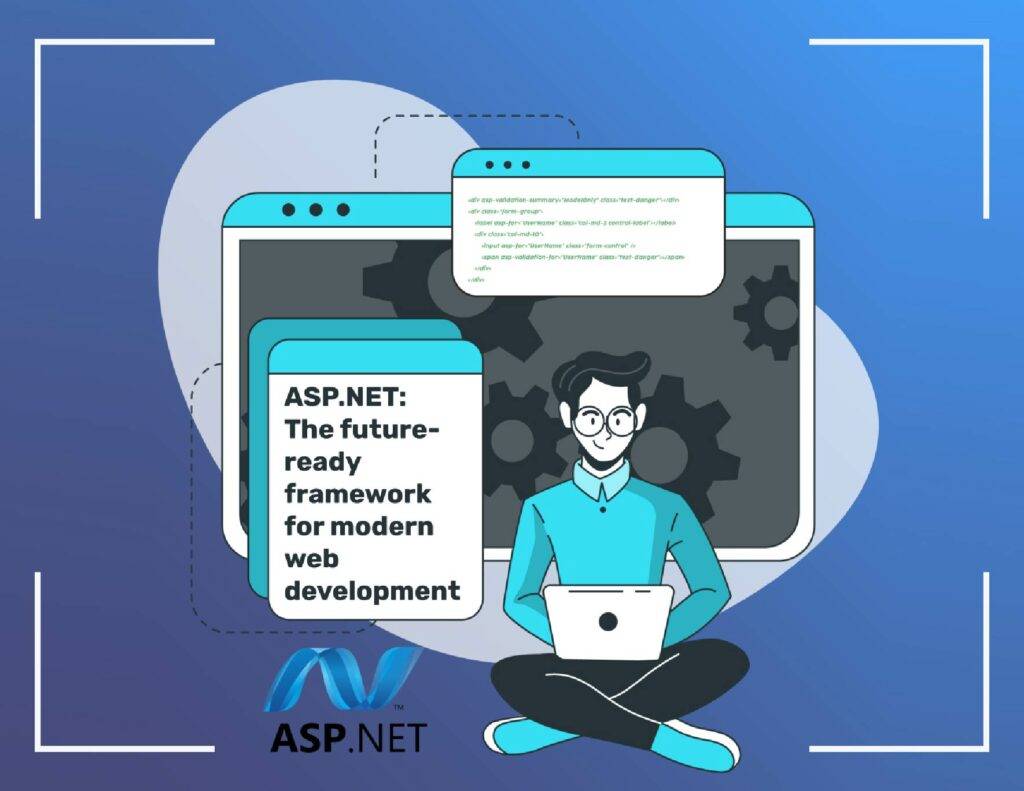Web development is among the Software industry’s most in-demand and rewarding fields. However, it is also one of the most complex and challenging, requiring skills, knowledge, and creativity. To make web development more accessible and efficient, web developers use various frameworks and technologies that provide tools, features, and guidelines for creating web applications. One of the most popular and widely used frameworks is ASP.NET.
ASP.NET is an open-source, cross-platform framework for building modern web applications and services. It is developed and maintained by Microsoft and the .NET community and runs on the .NET platform. ASP.NET offers web developers a variety of options and possibilities for creating web applications, such as web forms, MVC, Razor Pages, Blazor, Web API, SignalR, and more. ASP.NET
It is Simple.
One of the main reasons why web developers choose ASP.NET is because it simplifies web development. ASP.NET is designed to be modular and flexible, allowing web developers to use only the components and features that they need for their web applications. ASP.NET also provides a consistent and intuitive programming model that makes coding, debugging, and testing easier and faster. For example, ASP.NET supports the C# language, which is a powerful, expressive, and modern language that supports features such as async/await, LINQ, generics, delegates, etc. ASP.NET also supports other languages, such as Visual Basic, F#, and more.
ASP.NET also provides web developers various tools and features that help them create web applications more efficiently and effectively. For example, Razor Pages is a feature that allows web developers to create web pages using HTML and C# in a single file without needing controllers or models. Razor Pages also support tag helpers and HTML elements with server-side functionality. Another example is Blazor, a feature that allows web developers to create interactive web UIs using C# and HTML without needing JavaScript. Blazor also supports WebAssembly, a technology that enables web browsers to run compiled code at near-native speed. Other examples of tools and features that ASP.NET provides are MVC, which is a pattern that separates the concerns of the web application into models, views, and controllers; Web API, which is a framework for creating RESTful web services; SignalR, which is a library for creating real-time web applications; and more.
It is Powerful.
Another reason why web developers choose ASP.NET is because it enables them to create dynamic, interactive, and scalable web applications. ASP.NET supports various languages, platforms, and databases, giving web developers more options and flexibility for their web applications. For example, ASP.NET can run on Windows, Linux, macOS, and Docker containers, allowing web developers to deploy their applications on different environments and devices. ASP.NET also supports various databases, such as SQL Server, MySQL, MongoDB, Cosmos DB, and more, allowing web developers to store and manipulate data differently.
ASP.NET also enables web developers to create web applications that can handle high volumes of traffic and requests without compromising performance or reliability. ASP.NET uses various techniques and technologies to achieve this goal, such as caching, load balancing, asynchronous programming, dependency injection, logging, etc. For example, caching is a technique that stores frequently used data or resources in memory or disk, reducing the need for accessing the database or the network. Load balancing is a technique that distributes the workload among multiple servers or instances of the web application, improving availability and scalability. Asynchronous programming is a technique that allows the web application to perform multiple tasks concurrently without blocking the main thread of execution. Dependency injection is a technique that will enable the web application to decouple its components and dependencies from each other, making them easier to test and maintain. Logging is a technique that records the activities and events of the web application in a file or database, making it easier to monitor and troubleshoot.
ASP.NET also offers web developers two versions of the framework: ASP.NET Core and ASP.NET Framework. ASP.NET Core is the newer and more modern version of the framework that offers more features and benefits than ASP.NET Framework.
It is Future-Ready.
The last reason web developers choose ASP.NET is because it evolves with the changing needs and web development trends. ASP.NET incorporates new features and updates that make web development more productive, innovative, and enjoyable. ASP.NET 6 is the latest version of the framework that was released in November 2021. It offers many improvements and enhancements over previous versions, such as:
* Minimal APIs: A feature that allows web developers to create web APIs using minimal code and configuration, making them faster and easier to create and maintain.
* Hot Reload: A feature that allows web developers to apply code changes to their web applications without restarting or losing the app state, making them more efficient and agile.
* Blazor Desktop: A feature that allows web developers to create desktop applications using Blazor, making them more consistent and cross-platform.
* .NET MAUI: A feature that allows web developers to create native mobile applications using .NET, making them more versatile and performant.
ASP.NET also faces some challenges and opportunities in the future, such as:
* Security: A challenge that requires web developers to protect their web applications from various threats and attacks, such as cross-site scripting, SQL injection, denial-of-service, etc. ASP.NET provides various mechanisms and tools to help web developers secure their web applications, such as authentication, authorization, encryption, hashing, etc.
* Performance: A challenge that requires web developers to optimize their web applications for speed and efficiency, such as reducing the size of the files and resources, improving the response time and latency, increasing the throughput and concurrency, etc. ASP.NET provides various techniques and technologies to help web developers improve their web applications’ performance, such as compression, bundling, minification, caching, etc.
* Compatibility: A challenge that requires web developers to ensure that their web applications work well on different browsers, devices, and platforms, such as Chrome, Firefox, Edge, Safari, iOS, Android, Windows, Linux, macOS, etc. ASP.NET provides various features and libraries to help web developers achieve compatibility for their web applications, such as responsive design, progressive enhancement, polyfills, etc.
* Innovation: An opportunity that allows web developers to explore new possibilities and solutions for their web applications, such as artificial intelligence, machine learning, blockchain, augmented reality, virtual reality, etc. ASP.NET supports various frameworks and services that enable web developers to integrate these technologies into their web applications, such as ML.NET, Azure Cognitive Services, Ethereum.NET, ARCore.NET, VR.NET, etc.
The final dot.
ASP.NET is a framework that simplifies, powers, and future-proofs web development. It offers web developers a variety of options and possibilities for creating web applications, such as web forms, MVC, Razor Pages, Blazor, Web API, SignalR, and more. It also supports various languages, platforms, and databases, giving web developers more flexibility and versatility for their web applications. It also incorporates new features and updates that make web development more productive, innovative, and enjoyable, such as minimal APIs, hot reload, Blazor desktop, .NET MAUI, and more. ASP.NET also faces some challenges and opportunities in the future, such as security, performance, compatibility, and innovation. ASP.NET is a framework with a lot of value and potential for web developers, and it is worth learning and using.



